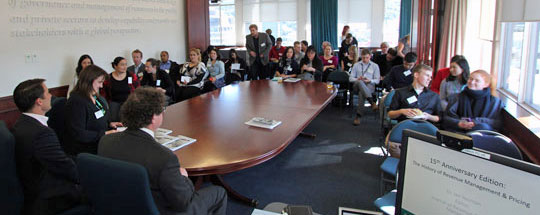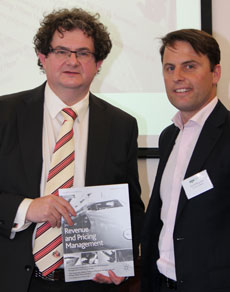Celebrating the 15th anniversary edition of the Journal of Revenue & Pricing Management
The tourism group celebrated the 15th anniversary edition of the Journal of Revenue & Pricing Management with a seminar led by Dr Ian Yeoman and David Meaclem (Air New Zealand).
Celebrating the 15th anniversary edition of the Journal of Revenue & Pricing Management
The tourism group celebrated the 15th anniversary edition of the Journal of Revenue & Pricing Management with a seminar led by Dr Ian Yeoman and David Meaclem (Air New Zealand).
How much would you pay for an airline seat?

The tourism group celebrated the 15th anniversary edition of the Journal of Revenue & Pricing Management with a seminar led by Dr Ian Yeoman (Victoria University) and David Meaclem (Air New Zealand). The primary aim of Revenue Management is selling the right product to the right customer at the right time for the right price.
Ever since the deregulation of airline industry in the USA, and the emergence of the internet as a distribution channel, Revenue Management has come of age. The special edition traced the history through deregulation, evolution, theories and application.
Journal editor Dr Ian Yeoman outlined how the journal has bridged theory and practice, with contributions from leading academics and practitioners including Peter Belobaba (MIT), Sherri Kimes (Cornell), Ben Vinod (Sabre) and Dax Cross (Revenue Analytics).
The special issue portrayed key developments such as:
Deregulation of the US air industry: The US Domestic Airline Deregulation Act (1978) mandated deregulation of route restrictions led to the rise and fall of PEOPLExpress, the world’s first budget airline. The fall is attributed to America Airlines use of yield management to compete with PEOPLExpress inventory through capacity controls.
Littlewoods Rule: In 1972, Ken Littlewood of British Overseas Airways Corporation proposed the first static single resource quantity based RM model. It was a solution method for the seat inventory problem for a single leg flight with two fare classes.
Single leg to Origin and Destination (O&D) pricing: The ability to forecast multi leg itineraries rather than single legs means better optimization from a pricing perspective thus overcoming one of the limitations of Revenue Management systems for hub and spoke carriers ??
The impact of Expected Marginal Seat Revenue heuristic on optimisation systems: In 1987, Peter Belobaba’s PhD thesis’s “EMSR optimization method to calculate bookings limits”? extended Littlewoods Rule and became the foundation of most Airline Revenue Management systems.
The use of family fares: In early 2000, fare families have become a popular way to organize and market airline products. Typically, fare families correspond to product categories that differ by relatively more important features such as refundability or baggage fees while products within a family may be differentiated to a lesser degree.
Technological developments: Moore’s law, where technological advancement means computer processing power enables the running of complex algorithms to simulate airline network optimization problems.
Consumer and price transparency: The ability of consumers to compare prices and achieve the best deal as a consequence of the emergence of online travel agents.
Pricing capabilities in organisations. Price becoming increasing important within firms, from a tactical to a strategic issue.

David Meaclem, Head of International Route Performance, discussed how these theories work in practice.
He talked about the era in the early 1970s, where all seats are offered at the same price, to the introduction of an automated system in the early 1990s based upon 8 price points across three cabins using Sabre Airmax system. Today, the O&D systems optimizes revenue across routes using a bid pricing.
The special issue is published in Volume 15, Issue 3-4 and can be found.
A special thanks to Palgrave and the School of Management for sponsoring the event.
Email:
